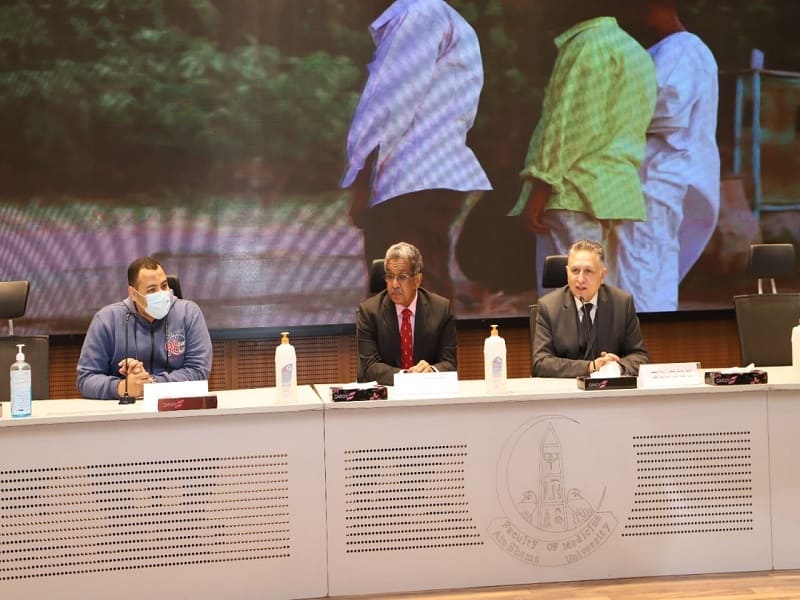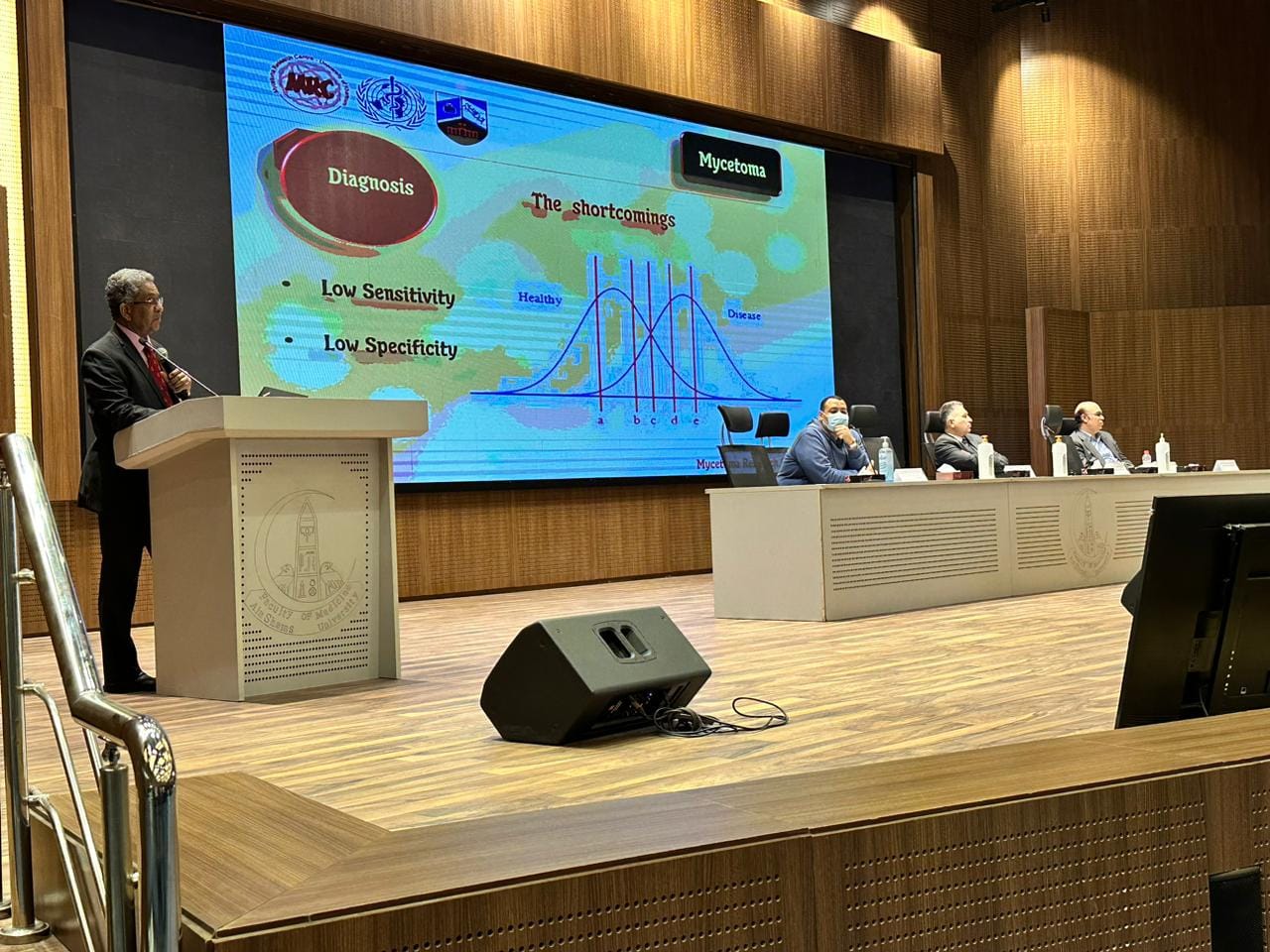
Early diagnosis and health care for mycetoma patients are the first lines to address the disease
The International Professor Ahmed Fahal: Early diagnosis and health care for mycetoma patients are the first lines to address the disease, and Ain Shams professors always prove leadership in the medical field
Under the auspices of Prof. Dr. Mahmoud El-Meteini, President of Ain Shams University, Prof. Dr. Mohamed Ayman Saleh, Vice President for Postgraduate Studies and Research, Prof. Dr. Ali Al-Anwar, Dean of the Faculty of Medicine, and Prof. Dr. Osama Mansour, Vice Dean of the Faculty of Medicine for Graduate Studies and Research, Prof. Dr. Ahmed Fahal, Professor of Surgery at the Faculty of Medicine, University of Khartoum and Director of the Mycetoma Center, gave a scientific lecture entitled “Mycetoma Disease: Challenges and Solutions”.
This lecture was held within the activities of the postgraduate studies sector at the Faculty of Medicine and Ain Shams University.
This lecture comes within the framework of Ain Shams University’s interest in hosting international professors in various fields to present all that is new in the fields of medical research and health care as one of the most important priorities that distinguish Ain Shams University among the ranks of the first universities in the medical and health fields at the local and international levels, in order to achieve the vision Egypt under the auspices of His Excellency President Abdel Fattah El-Sisi, President of the Republic in strengthening the health care system and medical services in Egypt.

The activities started the day before yesterday with a reception by Prof. Dr. Osama Mansour, Vice Dean of the Faculty of Medicine for Graduate Studies and Research, and Dr. Abdullah Sami, General Supervisor of the University’s Scholarship Welfare Office, for Prof. Dr. Ahmed Fahal, inside the office of Prof. Dr. Osama Mansour, at the Faculty of Medicine, Ain Shams University, where he addressed a Prof. Dr. Osama Mansour, and Prof. Dr. Ahmed Fahal Scientific discussions of some problems related to fungal diseases that affect some cases, including those related to the ear, nose and throat specialization, then he moved with Professor Ahmed Fahal to the lecture venue in the Mahlawy Amphitheatre, at the Faculty of Medicine, Ain Shams University.

The lecture began with a speech delivered by Prof. Dr. Osama Mansour to introduce Professor Ahmed Fahal and his efforts in dealing with mycetoma in Sudan, then Dr. Abdullah Sami gave his speech to welcome Professor Ahmed Fahal with a presentation of the awards he received globally from different countries in recognition of what Dr. Fahal’s efforts in the field of endemic and neglected tropical diseases include, for example, the Donald MacKay Medal from the Royal Society of Tropical Medicine and Hygiene (RSTMH), a knighthood from the French Government for distinguished academic achievements from the Republic of France, and the Order of Merit from the Republic of Italy.
Prof. Dr. Ahmed Fahal gave a lecture that dealt with the different aspects of the disease, its spread, methods of diagnosis, awareness programs carried out by the Mycetoma Center in places where the disease spreads, methods of treatment, various factors that increase the risk of spreading the disease, and recent research in the field of mycetoma that dealt with various aspects, including modern diagnostic methods For the disease, modern drugs for the treatment of mycetoma, and the study of the genetic relationship to the disease.
His Excellency also talks about some of the problems that patients with mycetoma in Sudan suffer from, which may sometimes lead to amputation of the affected organ, with a presentation of some case studies of cases that were dealt with within the mycetoma center.
In the end, His Excellency presented the success story of the center in achieving international cooperation at all levels, which allows training a new generation of researchers to achieve the highest levels of competence in the various fields within the center. His Excellency also explained that the center has become a destination for treatment for many cases from different countries outside Sudan, including African and Asian countries.
The faculty staff of the Departments of Surgery, Plastic Surgery, Public Health, Chest, and Microbiology at the College of Medicine and the Department of Microbiology at the Faculty of Science presented a set of questions and discussions on various topics related to his Excellency’s lecture and the disease situation in the light of their experience in this field and exposure to cases related to fungal diseases.
The discussions dealt with various topics such as treatment methods, modern medicines to treat cysts in the mycetoma center, antifungal resistance, duration of treatment, the success rate of treatment attempts for different cases, awareness programs in affected villages, challenges facing the center’s team in applying disease prevention methods, and some Techniques to be applied during surgeries related to this disease.
This discussion continued for a long time to reflect the interest of the faculty staff in this disease due to its great importance in the region and the need for full awareness of such cases for the speed of their diagnosis because the more the therapist reaches an early diagnosis, the greater the chance of treatment without any other health complications, as discussed by Prof. Dr. Ahmed Fahal during the lecture.
The discussion also included inquiries related to the environmental aspects that contribute to the spread of the disease in Sudan, where Professor Fahal gave the floor to Dr. Abdullah Sami, who had previously presented scientific research in the same field in cooperation with the Mycetoma Center in Sudan, the University of Kansas in the United States of America, and the Rotterdam Medical Research Center in the Netherlands to reflect the role Which contributes to some different environmental factors in the spread of the disease and the presentation of the first map specifying the locations of the spread of the disease in Sudan to reflect one of the contributions of Ain Shams University in this field.
In addition, Professor Fahel discussed the results of recent research published by Prof. Dr. Sherif Zaki, Assistant Professor of Medical Mycology, Department of Microbiology, at the Faculty of Science, who reviewed some cases of mycetoma in Egypt.
In the end, Dr. Samia Abdo Gerges, Deputy Director of Ain Shams University Hospitals, accompanied Prof. Dr. Fahal on a tour to visit the laboratories of Ain Shams University specialized in the detection of various fungal diseases, which reflect the great interest given by Prof. Dr. Mahmoud El-Meteini, and Prof. Dr. Ayman Saleh stressed the importance of early detection of these diseases.
